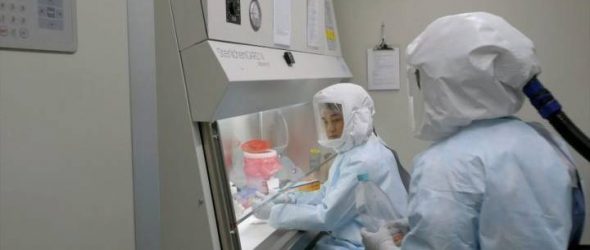Saskatchewan researchers are trying to see if plants hold a role in the fight against the novel coronavirus.
The Saskatoon-based medical cannabis company, Zyus Life Sciences, is working with the Vaccine and Infectious Disease Organization-International Vaccine Centre (VIDO-InterVac) to help develop a potential antigen that is usable in a COVID-19 vaccine.
“We had a protein platform that we’ve been working on for a number of years prior to being in the cannabis space… I asked (our team) the question, ‘do you think that we could produce a vaccine of this type of protein using our other plant system?’ And they didn’t really see why not,” Zyus CEO Brent Zettl said.
“We basically have two types of different compounds that we can produce. One using a cannabis plant but then one using a different plant that we can use to produce the protein… the cannabis side of it really just helped us to sort of determine the best ways to manufacture drugs going forward.”
Zyus said it will leverage its bio-pharmaceutical plant technology platform to develop and express a protein that VIDO-InterVac has identified as a potential antigen for a COVID-19 vaccine.
“The genetic information that VIDO-InterVac has developed to find the actual antigen that would work as a vaccine, that’s actually a strand of protein. So then we take that DNA and we actually then design it in a plant and then the plant itself can manufacture that same protein,” Zettl said.
[ Sign up for our Health IQ newsletter for the latest coronavirus updates ]
“We will take and purify that protein and get it into a vial and then return it back to VIDO-InterVac who will then make it into a vaccine and then present it to animals in a trial. It’s just another way of manufacturing this particular vaccine using plants instead of animals.”
Zettl said developing vaccine components in plants instead of the traditional method of animal cells has potential benefits.
“There’s a few benefits. One is, once you teach a plant to do something like this, a plant does it very efficiently and very effectively as it clones. It will clone that protein successfully year over year,” he said.
“The second (benefit) is getting to scale. We want to make this onto a much larger scale much quicker once we teach a plant to do that… It can be a lot more rapid in its development so we can get a much quicker development of the product on a scale which ultimately may translate into a cheaper way of producing it in the future.”
“The last (benefit) is that certain people who would want, if a vaccine becomes available, (one) from a plant source as opposed to an animal source. Especially people who are more sensitive to that sort of thing, like vegetarians and vegans.”
Zyus’ efforts are already underway with a target of extracting enough of the protein through its plant expressions system for VIDO-InterVac to determine its effectiveness in animal models of COVID-19.
“We expect to have a purified vaccine protein in a vial by the end of August that we can then give to VIDO-InterVac and then see if it’s the right one, see if it needs to be adjusted or see if it’s ready to be made into a vaccine that can be presented to animals,” Zettl said.
“That’ll be the first transfer point where we can actually see what’s happening.”
VIDO-InterVac director Dr. Volker Gerdts said through this partnership, they are exploring alternative methods of antigen production with a goal to potentially expand global vaccine production capacity for COVID-19.
The approach is one of several that Saskatoon-based VIDO-InterVac is exploring in an effort to expand vaccine development against the novel coronavirus, officials said.

Questions about COVID-19? Here are some things you need to know:
Symptoms can include fever, cough and difficulty breathing — very similar to a cold or flu. Some people can develop a more severe illness. People most at risk of this include older adults and people with severe chronic medical conditions like heart, lung or kidney disease. If you develop symptoms, contact public health authorities.
To prevent the virus from spreading, experts recommend frequent handwashing and coughing into your sleeve. They also recommend minimizing contact with others, staying home as much as possible and maintaining a distance of two metres from other people if you go out.
For full COVID-19 coverage from Global News, click here.
© 2020 Global News, a division of Corus Entertainment Inc.


